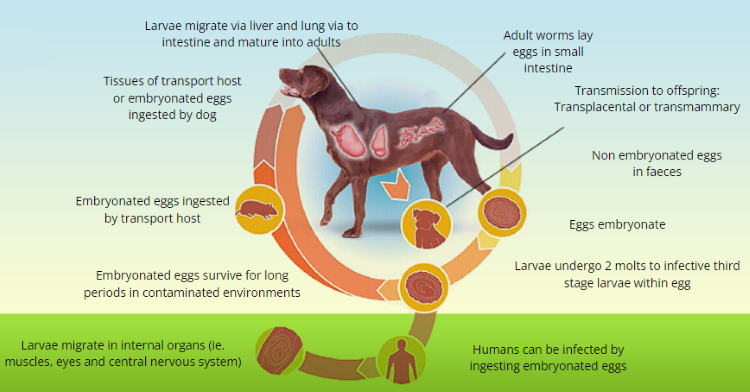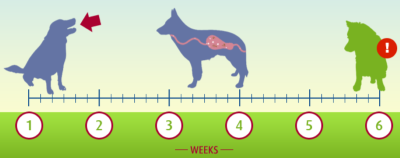What are roundworms in pets?
Roundworms are the most common intestinal parasite in dogs and cats. The most common species affecting pets are Toxocara canis, Toxascaris leonina and Toxocara cati.
Long, white and spaghetti-like, they live in the small intestines of infected pets and the eggs are passed out in the faeces of infected dogs and cats. The eggs can be found in soil anywhere, from parks and playgrounds to gardens.

Roundworm Factoid!
Studies have found that 75% of sandpits1 are contaminated with roundworms and their eggs - and a survey carried out in the Netherlands found roundworm eggs in 15% of potting plant soil2. So even animals that spend most of their time indoors can still be at risk of exposure to worms.
Dogs and cats at risk of roundworms include:

The symptoms of roundworms
Roundworms can cause the digestive system to become blocked and inflamed, but it is not always apparent if your pet has picked up roundworm as adult dogs and cats may not necessarily display any obvious symptoms. However, puppies and kittens can be more severely affected; symptoms can include:
- vomiting
- diarrhoea
- lethargy
- poor coat condition
- weight loss
- slow growth
- a 'pot bellied' look
They may even develop pneumonia.

Lifecycle and stages of roundworms

The incubation period for roundworm is about 4-6 weeks, meaning it can be over a month between ingesting the roundworm, and them passing eggs in their faeces which may infect other animals. Depending on the lifestyle of the dog, some may need worming monthly to minimise the risk of passing roundworm eggs.

Risks of roundworms to humans
We humans are not immune to the roundworm either – the eggs can be found in soil (anywhere, from parks and playgrounds to gardens) so if we’re not careful we can unwittingly ingest them from dirty hands or a dropped, but hastily retrieved, biscuit.

Unfortunately, children are particularly vulnerable as they are most likely to pick up an infection because their immune systems are still developing and because they are always grabbing, touching and sticking their hands in their mouths.
The problems come as the roundworm larvae pass into internal organs, affecting the muscles, eyes and central nervous system. A fever may develop and there can be internal damage to the lungs, liver and eyes.
Spread of roundworms in Europe
Roundworms can be found right across Europe:

How to get rid of roundworms in pets
Fortunately pets can be treated. Ask your vet for advice on which wormer will suit your pet best and how often it should be used.
Find out more about other worms in pets
- Abe N and Yasukawa A (1997). Prevalence of Toxocara species eggs in sandpits of parks in Osaka City, Japan, with notes on the prevention of egg contamination by fence construction, Journal of Veterinary Medical Science 59(1): 79-80
- Tracking ticks in the Netherlands. Veterinary Record. 18 February 2006; Volume 158; Issue 7
